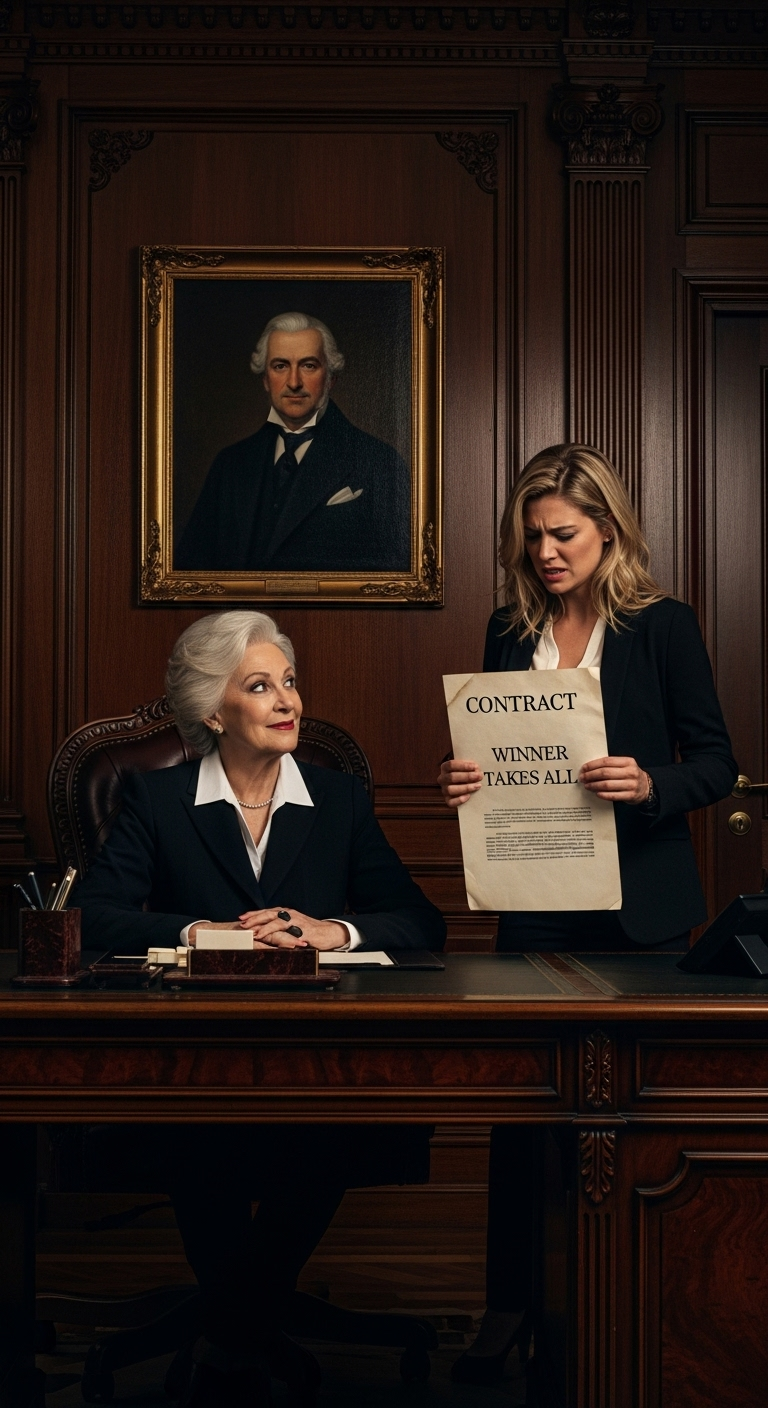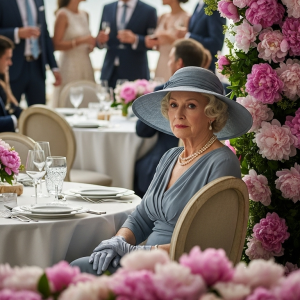Hey everyone,
My name is Clara. And this isn’t just a story; it’s the chronicle of my own coup d’état. I’m a chef with not a single drop of Italian blood, stepped into the territory of a prestigious Italian dynasty. I married their son, was backed into a corner, and had everything taken from me. But then, I used the Queen’s sharpest sword—the culinary legacy she staked her entire pride on—to topple her throne.
Forget about romantic, delicious food. This was a war for power, a tangled web of deceit, and a dish of revenge served in the most perfectly way: not cold, but piping hot, presented exquisitely on a flawless plate of pasta.
My story takes place in the North End of Boston. If you’ve never been, imagine a small corner of Italy dropped into the heart of America. Cobblestone streets, tightly packed red-brick buildings, and an air that constantly smells of sautéed garlic, espresso, and freshly baked cannoli. Here, “family” isn’t just a word. It’s a dynasty. And the Rossi family was one of the oldest dynasties of all.
For over 100 years, “Trattoria Rossi” has been an icon. It wasn’t just a restaurant; it was a sanctuary where generations came to enjoy what was said to be the best pasta in Boston. And the soul of that sanctuary, the most heavily guarded treasure, was the secret sauce recipe: “Sugo della Famiglia”—The Sauce of the Rossi Family.
The guardian of that treasure was my mother-in-law, Isabella Rossi, or as everyone respectfully called her, Nonna Isabella.
To understand the storm that came, you must first understand the false peace that preceded it. And nothing was more perfectly false than a Rossi family Sunday dinner.
Every Sunday, at 7 PM sharp, the family would gather at a long table in the most private corner of Trattoria Rossi. Nonna Isabella, in her elegant black dress and an unchanging string of pearls, would sit at the head of the table, the position of a queen. Beside her was her only son, my husband, Marco.
Marco Rossi. He was the reason I was here. We met when I was a young chef fresh out of Le Cordon Bleu, working in a modern French restaurant. He was an architect, kind, gentle, with warm brown eyes and a smile that could chase away any gloom. He loved me for who I was, for my modernity, for my different culinary passion. And I loved him, for his tenderness and his kind heart. When he proposed, I accepted without a moment’s hesitation, knowing I was about to step into a completely different world.
Sitting across from us was always Sofia, Marco’s childhood friend. Sofia was everything I was not: a pure-blooded Italian girl with jet-black hair, olive skin, and fluent Italian. She was the one Nonna Isabella, deep down, always wanted Marco to marry. To me, Sofia was always as sweet as a cannoli. “Oh, Clara, your dress is so beautiful,” or “Clara, you cooked this so well, it’s almost like how the Italians do it.” Her compliments always came with a poison-tipped needle that only I could feel.
And then there was me, Clara, the non-Italian daughter-in-law. I sat there, trying my best to fit in. I learned Italian, learned how to make tiramisu, learned to smile at the right times and stay silent in the right places. I showed absolute respect to Nonna Isabella, though she never truly saw me as a daughter. In her eyes, I would forever be “l’Americana”—the American girl who had “stolen” her son.
“Tradition is the foundation of our family,” Nonna would often say during those dinners, her eyes sweeping over me with hidden meaning. “And the Sugo della Famiglia is the heart of that tradition. It’s not just tomatoes and basil. It is blood, it is history, it is the soul of the Rossi family.”
She was right. The sauce was truly delicious. But I, with the eye of a professional chef, noticed something that their blind family loyalty wouldn’t let them see: the restaurant was slowly dying.
The menu hadn’t changed in 40 years. The paint was peeling. The tablecloths were frayed. The customers were mostly nostalgic old-timers and curious tourists. Revenue was steadily declining each quarter. Trattoria Rossi was living on the breath of the past, and that breath was growing weaker.
I tried to make a small suggestion during one Sunday dinner. “Nonna,” I began cautiously. “I just learned a wonderful technique for fresh pasta stuffed with ricotta and lemon zest. Perhaps we could try adding it to next week’s special menu? To attract some younger customers.”
The table fell silent. Nonna Isabella put down her fork, a small but powerful gesture. She looked at me, a faint smile on her lips, but her eyes were as cold as ice.
“In this house, we only eat the Rossi way, my dear,” she said, her voice even but sharp as a knife. “Nonno Marco’s recipe has been good enough for the last 100 years, and it will be good enough for the next 100.”
I felt my cheeks flush. I looked to Marco for support. He just stared down at his pasta, quickly changing the subject. “Ah, Sofia, how’s that project at your firm going? Thinking of seeing a movie this weekend?”
Sofia smiled at me, a look of pity in her eyes. “Your idea is great, Clara. But you know Isabella, she values tradition very much.”
That was my “normal life.” A fragile peace built on unspoken words, on suppression and an invisible fear. I thought I could live like that, for the love of Marco. But I didn’t know that the restaurant’s decay was just a symptom of a cancer that had been growing deep within this family for a long time. And I, inadvertently, was about to stick a knife right into that tumor.
The business situation grew worse. One day, I overheard a conversation between Marco and the accountant. Words like “debt,” “cost-cutting,” and “hanging on” flew into my ears like bullets. That night, I couldn’t sleep. Trattoria Rossi wasn’t just my in-laws’ business. It was their legacy, Marco’s future, and my future too. I couldn’t stand by and watch it crumble.
I spent two solid weeks, after my exhausting shifts at my own French restaurant, diving into research. I analyzed the market, studied competitors, created a detailed marketing plan, and designed a modern side menu that still respected the core dishes. I had no intention of touching the sacred “Sugo della Famiglia.” On the contrary, I wanted to revive the restaurant so more people could enjoy it.
The 20-page plan, printed in color and professionally bound, was all my passion and respect. I chose a Thursday evening, not the tense Sunday dinner, to present it. I invited Nonna, Marco, and Sofia to our apartment. I cooked a lavish meal myself. I did everything by the book.
After dinner, I took a deep breath and began. “Nonna, Marco, Sofia,” I said. “I know the restaurant’s business is struggling. I’ve taken the time to do some research, and I believe we can change that. I’ve prepared a few ideas…”
I presented clearly and enthusiastically. I talked about creating a professional website, running social media ads, collaborating with food bloggers, hosting cooking classes, and introducing a few new appetizers and desserts.
When I finished, the room was silent. Marco looked at me with a complex expression, a mix of admiration and anxiety. Sofia clapped with fake enthusiasm. But Nonna Isabella just sat there, her face emotionless.
And then, she spoke. “So,” she said slowly, word by word. “After everything this family has done for you, after welcoming you into our home, this is how you repay us? By saying our family’s 100-year legacy isn’t good enough?”
“No, that’s not it at all!” I quickly explained. “I have no desire to change the family sauce or the core values. I just want to bring in more customers so they have the chance to enjoy it. We need to change to survive, so that legacy isn’t forgotten!”
“CHANGE?” She slammed her hand on the table, making the glasses rattle. “You, an outsider, an l’Americana who knows nothing of Italian pride, what do you know of our traditions? You think a few flashy websites and some fancy dishes can replace the sweat and tears of three generations of Rossis? This is an insult!”
Her wounded pride and fear of losing control had turned her into a different person. I felt deeply hurt. I turned to Marco, my eyes pleading. “Marco, say something. You understand what I mean.”
Marco shot up, but not to defend me. He paced the room, running his hands through his hair. “Mom, calm down. Clara, you too. Maybe… maybe this isn’t the right time.” He wouldn’t look me or his mother in the eye. He was trapped in the middle, and his silence, his avoidance, was a choice. He had chosen not to protect his wife.
And Sofia, the opportunist, delivered the final blow. “I think Clara’s ideas are interesting,” she said sweetly, placing a comforting hand on Nonna’s shoulder. “But of course, this is your life’s work. You know best what the restaurant needs. The final decision has to be yours.”
It was a seemingly innocent remark, but it insidiously added fuel to the fire. It painted me as a challenger to Nonna’s authority. It drew a clear battle line.
That night, after Nonna and Sofia left in a huff, Marco and I had our first real fight. “Why didn’t you say anything?” I screamed, tears streaming down my face. “Why didn’t you defend me?” “What did you want me to do?” he yelled back. “Go against my mother? Don’t you understand how important she is to me? Can’t you just try to please her for once?”
I looked at the man I loved, and for the first time, I saw a weakness I couldn’t accept. The fragile peace was shattered. The real power struggle had begun.
I thought it would end there. I would back down, and the restaurant would continue on its downward spiral. But I had underestimated Nonna Isabella’s cunning.
A week later, the family lawyer called me. Nonna wanted to see me. Alone.
I went to the lawyer’s office with a bad feeling. Nonna sat there, majestic and cold. Beside her was Sofia, wearing a look of fake sympathy.
“Clara,” Nonna began, without any preamble. “I’ve thought about your proposal. I admit you have passion. But passion alone is not enough. You need to prove yourself.”
She pushed a stack of documents toward me. “This is a contract. I will give you full management control of Trattoria Rossi for one year. You can do whatever you want with it.”
My heart beat a little faster. A glimmer of hope.
“But,” she continued, “there is a clause. If the restaurant suffers a loss for three consecutive quarters, the contract will be terminated immediately. You will have to leave the restaurant, leave the family business, and walk away with nothing. All management rights will then be transferred to Sofia, who carries Rossi blood and understands the value of family.”

It was a trap. An ultimatum disguised as an opportunity. She was backing me into a corner, forcing me to gamble my entire future.
“Isabella, isn’t that a bit too harsh?” Sofia interjected, playing the part of the nice one. “Clara is family, after all.”
“Business is business,” Nonna said firmly, her eyes still locked on me. “Do you dare to accept this challenge, l’Americana?”
That night, I showed the contract to Marco. He read it, and I saw relief on his face. “Sign it, honey…” he said. “This is your chance to prove yourself to Mom. As long as you make her happy, everything will be fine.”
“This isn’t about making her happy, Marco,” I said, my voice tired. “This is a gamble. She wants me to fail.”
“Don’t be so pessimistic,” he held my hand. “I believe in you. We can do this.”
His blind optimism made me feel even more alone. But I was too tired to argue. Pushed from all sides, I signed that devil’s contract.
The first two quarters were a dream.
I threw myself into the work with 200% energy. I renovated the restaurant space, keeping the classic touches but adding light and warmth. I launched the website and social media channels, posting beautiful food photos and stories about the Rossi family’s history. I partnered with local hotels and tour companies. My side menu, with its fresh pasta and lesser-known regional specialties, became a hit.
The restaurant was always packed. Revenue soared. The local paper wrote an article praising “The Rebirth of an Icon.” I had proven myself right.
During Sunday dinners, Nonna Isabella said nothing, but I saw the annoyance in her eyes. Sofia was full of praise, but her smile never reached her eyes. My success was their failure, and they couldn’t stand it.
And then, the sabotage campaign began.
It started with small things. The long-time beef supplier suddenly called to cancel their contract, saying they “heard” the restaurant’s quality had declined. A few old-timer employees, close to Nonna, started being insubordinate, intentionally messing up my orders.
Then things got worse. Sofia, while “helping” me in the kitchen, “accidentally” spilled an entire jar of salt into the Bolognese sauce right before the dinner rush. A famous food blogger came to eat and later wrote a scathing review, saying the food was too salty and the service was chaotic. I knew for a fact that Sofia had orchestrated it.
Nonna went around the North End, whispering to her old friends that I was “destroying her husband’s legacy,” that I had replaced Italian olive oil with “cheap American oil.” The vicious rumors spread like wildfire.
Customer trust began to erode. Revenue plummeted.
The third quarter, the restaurant officially reported a loss. For the first time.
The family atmosphere became so suffocating, it was hard to breathe. The Sunday dinners stopped. Instead, there were constant arguments between me and Marco.
“Can’t you just try to please my mother for once?” he kept saying, as if it was all my fault. “Why do you always have to confront her?”
“Confront her?” I yelled back in desperation. “I’m trying to save your family’s business! Your mother and your childhood friend are deliberately sabotaging me, can’t you see that?”
“You’re being paranoid again,” he shook his head. “They’re not like that. Maybe… maybe your plan really has flaws.”
The distance between us grew, like a bottomless chasm. I was completely alone in this fight.
The fourth quarter, we lost money again. I had only one quarter left. Three months to turn things around, or I would lose everything. I felt hopeless, exhausted, and betrayed on all fronts. I had almost given up.
I was facing failure. The contract was about to expire. Nonna and Sofia were surely counting the days. Marco was growing more distant. I spent many sleepless nights staring at the ceiling, wondering where I had gone wrong.
But one thing kept nagging at me, something only a chef could feel. The sauce. The “Sugo della Famiglia.” Since I took over, I had followed the recipe Nonna had written down for me to the letter. But something was “off.” It was good, but it lacked a depth, a complexity I would expect from a 100-year-old recipe. It tasted like something that had been simplified, altered.
Driven by a final gut feeling, a desperate attempt to find an answer, I decided to investigate the family’s true legacy myself. I asked Marco about his grandfather’s keepsakes, Nonno Antonio, the founder of the restaurant.
“He died a long time ago, before I was even born,” Marco said. “His things are probably still in the restaurant’s attic. It’s really dusty up there, no one ever goes up.”
That’s where I needed to go.
The attic of Trattoria Rossi was like a time machine. Dust was thick, cobwebs everywhere. The air smelled of old wood, old paper, and forgotten memories. There were broken tables and chairs, empty wine barrels, and stacks of invoices from the 1950s.
I spent two weekends rummaging through everything, coughing in the dust. And then, in a dark corner, behind a stack of old newspapers, I found it. A small wooden box, intricately carved with a Tuscan pattern. The lid was unlocked.
My heart pounded. I opened it with trembling hands.
Inside, wrapped in faded velvet, were two items. A small leather-bound notebook, worn and discolored with age. And a letter, carefully sealed with wax, bearing the Rossi family’s olive tree crest.
I opened the notebook first. The handwriting inside was beautiful, flowing, written in black ink. This was it. The ORIGINAL RECIPE for “Sugo della Famiglia,” written by Nonno Antonio himself.
I read through the ingredients and the process. And I was stunned. It was different. Very different from the recipe Nonna Isabella had given me. The original recipe was more complex, more refined. It used three different types of tomatoes, a special red wine, a few secret herbs, and most importantly, a very slow cooking technique in an earthenware pot to let the flavors meld perfectly. Nonna Isabella’s recipe was just a simplified version, a pale shadow of the original.
But why? Why would she change it?
The answer was in the letter. I carefully broke the wax seal. The letter was addressed to “My Successor.”
To the one reading these words,
If you have found this notebook, it means my life’s work has not been entirely forgotten. The Sugo della Famiglia is my pride, everything I learned from my mother and grandmother in our Tuscan homeland. It is not just a dish; it is a story.
I write this letter with a heavy heart. My wife, Isabella, is a good woman, but she has always been obsessed with proving herself. She is a fine cook, but she does not have the “fire” of passion that cuisine demands. She is jealous of the restaurant’s success, jealous of the love the patrons have for my sauce. I fear that, after I am gone, out of pride and the fear of being compared, she will find a way to change it, to make it “her own,” so no one can say she is living in my shadow.
I hope my fears are wrong. But if they are right, and you are holding the original recipe, I have only one final wish.
I read on, tears starting to fall.
This recipe does not belong to me alone, nor does it belong only to the Rossi family. It belongs to anyone with enough love and passion to keep its flame alive. Legacy is not in the bloodline, my child. It is in the heart. Let this dish continue to tell its story.
Sincerely, Antonio Rossi
I collapsed onto the dusty attic floor and wept. Not tears of despair, but of vindication.
I understood everything. Nonna’s control. Her obsession with “tradition.” It was all built on a lie. For 40 years, she had been serving all of Boston an inferior version of the Rossi family legacy, all because of her own jealousy and selfishness.
I was no longer fighting against a “sacred legacy.” I was fighting against a fraud.
And this letter, this notebook, didn’t just give me the right recipe. It gave me legitimacy. It gave me the moral authority to fight back. I was no longer the “outsider trying to destroy things.” I was the “true successor” Nonno Antonio had been waiting for.
The game had changed. And this time, I was going to win.
I had only one week left until the final quarter’s business results were announced. One week to turn the tables.
I didn’t tell anyone about my discovery. Not even Marco. I no longer trusted him. I acted in silence.
I secretly bought all the ingredients for the original recipe, using my own money. I went to the restaurant at midnight, after everyone had gone home, and personally cooked a huge batch of sauce exactly as Nonno Antonio had written. The aroma that filled the air from the old earthenware pot I found in the attic was unbelievable. It was rich, complex, and had a depth that Nonna’s sauce never could.
The next day, I told the chefs I had “improved” the recipe a bit to “enhance the flavor.” I secretly replaced all the old sauce with the new.
And then, I played my trump card. I called every food critic, blogger, and influencer in Boston I knew. I told them, “Trattoria Rossi is undergoing a major change. Come and tell me what you think. This meal is on me.”
They came. And they were conquered.
In that final week, the restaurant was packed again. A buzz spread through the city about the “spectacular comeback” of Trattoria Rossi. Reservations were booked solid for the next six months. The revenue from that single last week offset all the losses and gave my final quarter a small but meaningful profit.
The day of judgment arrived. Nonna, Sofia, and their lawyer walked into my office, their faces triumphant. They had come to evict me.
“Time’s up, Clara,” Nonna said, unable to hide her glee. “The report showing three consecutive quarters of losses is here. According to the contract, you have to leave.”
I smiled. “You’re mistaken, Nonna. We made a profit.” I pushed the financial report toward them.
The shock and disbelief on their faces were palpable. “How… how is that possible?” Sofia stammered.
“By returning to the true legacy,” I said, my voice echoing in the room. And I placed the leather-bound notebook and Nonno Antonio’s letter on the table.
I had invited Marco to the meeting. He stood in a corner of the room, silent. I looked at him as I began to read his grandfather’s letter aloud.
When I read the part about the jealousy and the altered recipe, Nonna Isabella’s face went white as a sheet. Sofia stared at her in horror.
And Marco… I saw the shock, the pain, and the shame on his face. For the first time in his life, he truly “saw” his mother.
When I finished reading, no one said a word.
Nonna Isabella tried to fight back. “It’s a fake! This girl fabricated it!”
“Is that so?” I said, and I opened my laptop, showing them the articles, the 5-star reviews, the praise from critics from the past week. “They’re all talking about the ‘original flavor being back,’ about the ‘soul of Italy.’ They are praising Nonno Antonio’s recipe. The one you’ve been hiding for 40 years.”
The truth was out, undeniable.
And that’s when Marco acted.
He slowly stepped out from the corner. He didn’t look at his mother. He walked to my side. He took my hand.
“I’m sorry, Clara,” he said, his voice trembling but firm. He turned to face his mother. “I’ve been a coward. I let you control me, let you hurt the woman I love. I failed to protect my grandfather’s legacy. Mom… you’ve been lying to me my entire life.”
It was a historic moment. Her darling son, whom she had controlled for 35 years, had finally stood up to her.
Nonna Isabella didn’t scream. She didn’t argue. She just sat there, broken. All the power, the respect, and the lie that had protected her for 40 years—it had all turned to dust.
I wasn’t kicked out. I had won.
Six months have passed since that fateful confrontation.
Nonna Isabella has retired into seclusion. She signed over all her shares in the restaurant to Marco and has never returned. Sofia, without her pillar of support, left Boston.
The restaurant has been renamed. It’s no longer “Trattoria Rossi.” It’s now called “Osteria del Nonno Rossi” (Grandpa Rossi’s Tavern), to honor its true founder and legacy.
It is incredibly successful. Under my management, it has become one of the most highly-rated Italian restaurants in the city. I still keep the traditional touches, but I also add my own creativity and passion.
And Marco. Our marriage had to undergo major surgery, but it survived. The truth freed him from his mother’s shadow. He went to therapy to learn how to be a stronger man, a better husband. Now, he no longer stands in the middle. He stands beside me, as an equal partner, supporting me wholeheartedly in running the restaurant.
Tonight, after the last customers have left, I stand alone in the dining room, looking up at the portrait of Nonno Antonio that I had restored and hung in the most prominent spot. I never met him, but I feel a deep connection.
I look around the bustling, lively restaurant, listening to the sounds of laughter and clinking glasses. I think to myself: “Legacy isn’t in a locked-up recipe, nor is it in the bloodline. True legacy is the love and passion that is passed on.”
Marco walks over, bringing me a glass of red wine. He smiles, that warm smile I fell in love with.
“A toast?” he says.
“To what?” I ask.
He looks up at his grandfather’s portrait, then at me. “To Nonno Antonio,” he says. “And to the successor he was always waiting for.”
We raise our glasses together. The flame that Nonno Antonio lit 100 years ago, after being hidden for 40 years, was finally burning brightly again. And I will be the one to keep this flame alive.
Eight months have passed, and “Osteria del Nonno Rossi” just received its first Michelin star. I still can’t believe it. It’s a dream come true, not just for me, but for Nonno Antonio’s legacy.
Marco and I are still working on things together. Rebuilding trust takes time, but we’re on the right path. He has truly changed, becoming the partner I always needed.
As for Nonna Isabella, she still lives in the North End but very quietly. I hear she doesn’t leave her house much anymore. Sometimes, I feel a pang of sympathy for her loneliness, but then I remember what she did. She chose her own path.
Sofia moved to California and has apparently cut off all contact. Good for her.
Life has taught me a valuable lesson: Sometimes, you have to tear down old traditions to find the truth. And the truth, just like a good sauce, is always worth fighting for.
Two years have passed. The restaurant received its second Michelin star. But that’s not the biggest news.
Last month, Marco and I welcomed a beautiful baby boy. We named him Antonio, after his great-grandfather.
Last night, as I was holding little Antonio in my arms, watching him sleep, Marco came and handed me a small leather-bound notebook. It was a new one, but made in the exact same style as Nonno Antonio’s.
“So our son has something to start with,” he said.
I smiled, tears of joy streaming down my face. The legacy of the Rossi family will no longer be a secret guarded by jealousy. It will be a story, continued by many generations, written with love, honesty, and an endless passion for food.
Thank you for being on this journey with me.




